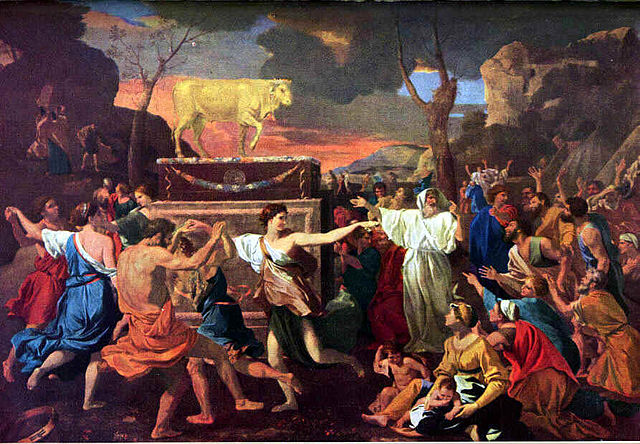Written by Devorah Friedman, Ha’Am’s External Managing Editor
This week’s Torah portion, Ki Tisa, begins with the completion of the Tabernacle and ends with a description of Moses’ relationship to G-d and his devotion to the people he led through the desert, with the episode of the golden calf in between. The calf episode, in which the Israelites became concerned after an apparent delay in Moses’ expected descent from Mount Sinai and subsequently smelted and worshiped a calf of solid gold, is a particularly troubling narrative given its juxtaposition to the completion of the Tabernacle and the revelation of G-d at Mount Sinai. The Jews were forty days fresh out of a heart-to-heart with G-d. Why would they make and worship a bovine-shaped chunk of aurum?
“When the people saw that Moses was late in coming down from the mountain, the people gathered against Aaron, and they said to him: “Come! Make us gods that will go before us, because this man Moses, who brought us up from the land of Egypt ― we don’t know what has become of him…” (Exodus 32:1).
Rashi, the foremost commentator on the Torah, explains that the Israelites feared that Moses had died on the mountain. They were afraid that not only had they lost their leader, but they had also lost the person who acted as G-d’s messenger and conduit. They didn’t feel adequate to speak directly to G-d, as doing so required intensive spiritual and mental preparation and focus. As Rabbi Menachem Mendel Schneerson explains, “the people,” a multitude of admirers who had traveled out of Egypt with the Israelites, then tried to create a substitute for Moses based on the gold cherubim atop the Ark in the Tabernacle. They justified this act by reasoning that if Moses’ brother Aaron were to create the calf, it would show G-d that their motives were sincere and that they weren’t simply trying to replace G-d with an idol. Unfortunately, their actions twisted their motives.
“[Aaron] took [the gold] from their hand[s], fashioned it with an engraving tool, and made it into a molten calf, upon which they said: ‘These are your gods, O Israel, which have brought you up from the land of Egypt!'” (Exodus 32:4).
Calf-worship was particularly prevalent in the Middle East at this time. In Egypt, the Apis bull was worshiped as a divine intermediary. The golden calf, which was originally intended to be an intermediary, quickly became an object of worship in itself. A feast was declared the next day and when Moses descended the mountain, tablets of the Ten Commandments in hand, he was greeted by a wild scene, with revelers openly sacrificing to the calf. The episode deeply scarred the nation, with the tablets smashed and thousands of worshipers dying as a result. Even many years later, after the Jews entered the land of Israel, the theme of golden calf-idols recurs in the narratives of the book of Prophets.
Why is the episode of the golden calf in the Torah? The Torah is not, as one of my junior high teachers was fond of saying, a history book; it didn’t record events simply for the sake of historical knowledge. The story of the golden calf is not uplifting and it doesn’t contain any Jewish laws.
Perhaps the episode of the golden calf, instead, is a story of good intentions gone terribly wrong. The Israelites acted upon their inclinations ― instead of, for example, figuring that they had miscalculated the number of days within which Moses had promised to return from atop the mountain, they cultivated an atmosphere of fear and hysteria. Instead of consulting with leaders such as their appointed tribal elders and Aaron to evaluate the situation, they assumed that their conclusion of Moses’ death was correct and immediately jumped on a plan to replace him.
We all experience times when we are confused and the right decision is far from obvious. It’s all too easy to jump to conclusions based on your biases, since, after all, the situation concerns you, or to justify one’s own golden calf based on an emotionally-charged and otherwise fuzzy rationale. It’s so easy to get carried away by enthusiasm and miss the goal. But the extent to which others are willing to lend an ear, a shoulder and some honest advice is truly remarkable, and it’s usually a good idea to get a second party’s objective opinion.
Shabbat shalom!
___________
This article is part of Ha’Am’s Friday Taste of Torah column. Each week, a different UCLA community member will contribute some words of Jewish wisdom in preparation for Shabbat.

